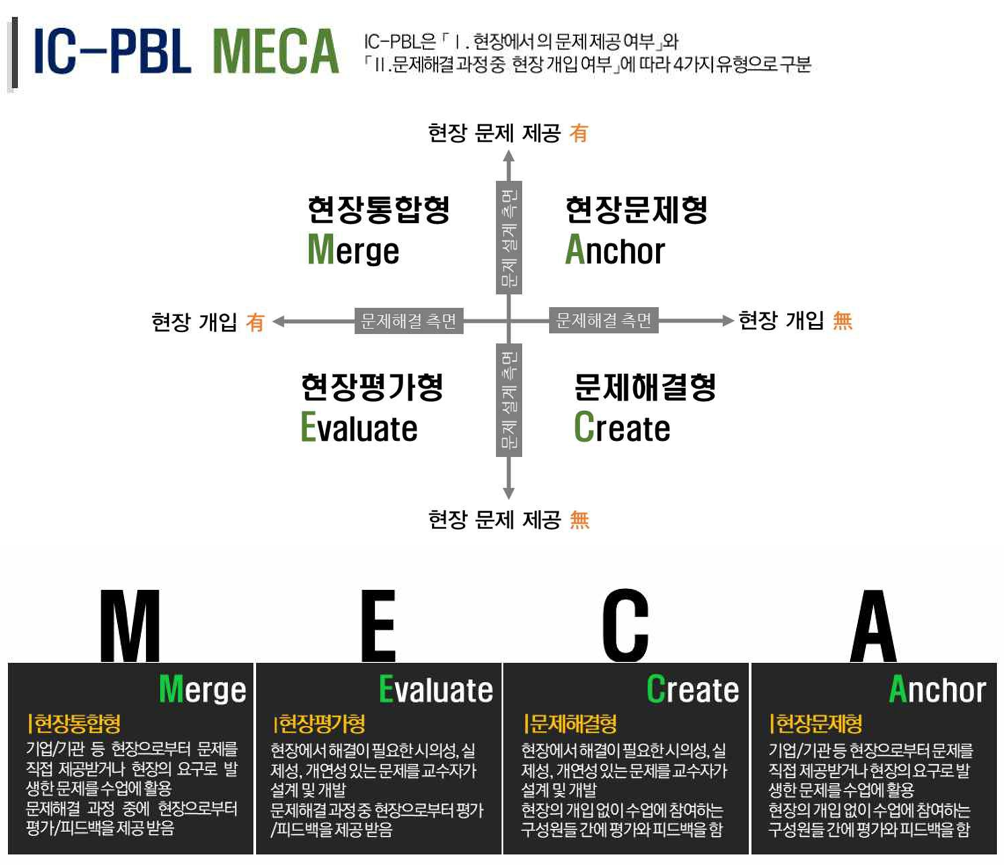7월 뉴스레터 센터 News
ERICA IC-PBL MECA
IC-PBL
정의 및 유형
1.
IC-PBL 정의
IC-PBL이란
Industry-Coupled Problem-Based Learning의 약자로 산업체(Industry), 지역사회(Society), 대학의
연계를 통해 학습자가 현장에서 발생하는 실제적인 문제를 해결하는 한양대학교 ERICA의
교육 모델입니다.
2.
IC-PBL 유형 : MECA
IC-PBL은
「I. 현장에서의
문제 제공 여부」와 「II. 문제해결
과정 중에 현장 개입 여부」에 따라서 4가지
유형으로
구분해
볼 수 있습니다.
유형을
구분 짓는 첫 번째 요인인 ‘현장
문제 제공’ 이란
현장으로부터 직접 문제를 제공받거나 현장의 요 구로부터 발생한 문제를 수업에 활용하는 것을 의미합니다. 두 번째로
‘현장 개입’이란, 문제해결
과정 중에 어떤 방식으로든 현장 전문가 및 외부의 평가나 피드백을 제공받는 것을 의미합니다. (※ 현장을
단순 방문하거나 현장 전문가 혹은 관계자와 면담 등 문제해결을 위한 정보를 수집하는 경우에는 현장의 개입이 있다고 보지 않습니다.)

3.
IC-PBL MECA 정의 및
사례
Definition and Types of IC-PBL
1.
Definition of IC-PBL
IC-PBL, an acronym of Industry-Coupled
Problem-Based Learning, is a learner-centered pedagogical model at Hanyang
University ERICA in which learners solve context-rich problems occurred in
real-life fields, coupled with industry, local society, and university.
2.
Types of IC-PBL: MECA
IC-PBL
is determined by two key factors: (i) whether problems are provided by the
fields, and (ii) whether problem-solving process is intervened by the fields,
by which it has four different types: M(erge),
E(valuate), C(reate),
and A(nchor).
The
first y-axis, “field-providing problem”, indicates that IC-PBL applies hands-on
problems to class that are directly provided or requested by the fields; the
second x-axis, “field intervention”, indicates that career-field experts’ and
external evaluation or feedback is intervened in the problem-solving process.
(Note: this field intervention does not include information gathering, such as
a simple visiting to industry or a simple interview with a field expert or the
person interested.)
3.
Definition
and Cases of IC-PBL MECA